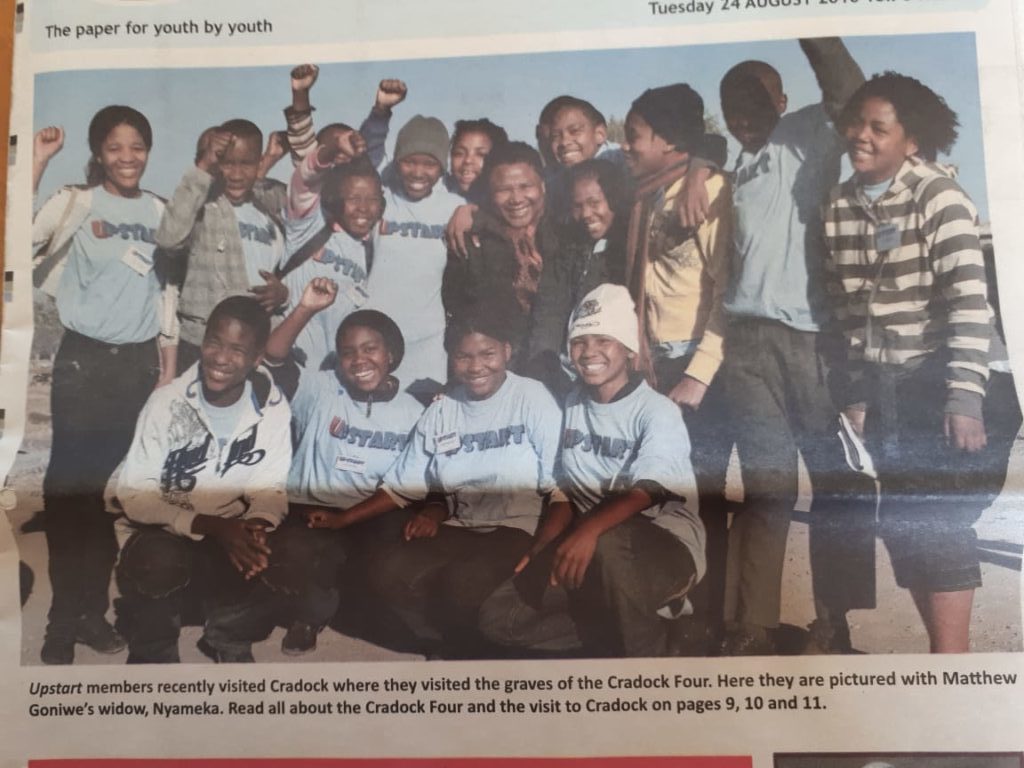
In an exclusive phone interview with Grocott’s Mail, Oliver spoke of the many sides of Nyameka Goniwe, “She was great fun. She loved a party. She loved opportunities to let her hair down and relax because I think that she was very, very tense all the time.” She suffered bouts of terrible depression but rarely let those around her see her despair “both for the sake of her children and because she was so strong she believed that that’s what she needed to be”.
Nyameka tested negative for Covid-19 in June, but when she displayed symptoms that could be linked to the virus in August, her son, Nyaniso encouraged her to go for a second test These symptoms included shortness of breath, fatigue and heart palpitations.
She was waiting for the results of this second test at her home when she passed away. Family members have since said that her test results subsequently proved to be negative and that she was only displaying ‘flu symptoms.
Goniwe was Speaker of the Inxuba Yethemba Municipality Council in Cradock when she passed away last Friday, but she was perhaps best known as the widow of Matthew Goniwe – one of the Cradock Four who was murdered by the security police in June 1985. Nyameka Goniwe, known as Nyame by those close to her, was a pupil in a class taught by Matthew before they got married in 1975. They had two children, Nobuzwe and Nyaniso. The couple were never allowed to enjoy their marriage together as they were constantly harassed by security police who persecuted Matthew because of his political views and activism against apartheid.
Nyameka gave an example of this harassment when she testified before the Truth And Reconciliation Commission in East London on 17 April 1996. She said:
“It happened in an early morning while Matthew was taking me to work in town. On the way our car was stopped by Fouché and Matthew was pulled out of the car. He then pointed a gun at Matthew’s head, shouting, ‘I’m going to kill you’. We were then driven to the police station, we were both searched, bodily searched and released later on. Matthew laid a charge against Fouché, which of course. never came to anything.”
The constant hounding and intimidation culminated on 27 June 1985 when Matthew Goniwe, Fort Calata, Sicelo Mhlawuli, and Sparrow Mkhonto left for Port Elizabeth. They were due back in Cradock that same night, but they never returned. Nyameka and her friends knew that something serious had happened.
When their bodies were found several days later they all had multiple stab wounds and were badly burnt.
Nyameka’s sadness is that she never saw justice done for the murder of her husband and his three comrades. The four were to become known as the Cradock Four and so they are buried next to each other in Cradock.
On the phone from Cape Town, Oliver said that Nyameka often spoke about fatigue. “I think that the assassination of Matthew and the other men and…. how wicked the apartheid system was… was ever present with her.”
Nyameka Goniwe completed her degree at the University of Fort Hare and was a social worker by profession. She also worked as a teacher and eventually became Mayor of Inxuba Yethemba Municipality.
When she retired as Mayor, she bought a house in Cradock and lived there with her daughter Nobuzwe. The people of the town did not allow her to enjoy her retirement and drafted her back into Council as the Speaker.
Oliver commented, “I don’t think she should have done that. She certainly didn’t want to,
but she was such a loyal soul.”
She added, “She was well loved wherever she went because she was gentle and caring and open and tried always to be very fair. Not always easy in a small town to be somebody who I think everybody loved – and I think everybody did like, and did love Nyame.”
Oliver was audibly devastated when she concluded the interview, “I loved her. I loved her dearly, I just loved her. People loved her and that’s why there are so many broken hearts at the moment.”


